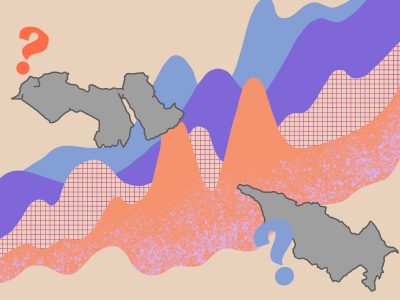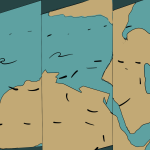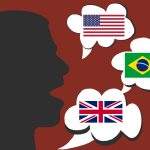The U.S. Census Bureau is aimed to analyze the diversity of the U.S. population, as well as allocate resources and implement changes accordingly. Information collected in every checked box of immigration documents, standardized exams and research surveys goes towards these goals.
Accordingly, it’s crucial these findings paint an accurate picture of the United States and its people.

Nonetheless, one group — Middle Eastern and North African (MENA) people — is consistently erased and systematically stifled by the baseless racial grouping of them as white.
After asking my Instagram followers for their opinions on MENA identities in relation to the census, it is apparent that this issue of misidentified race has been pressing for a vast community of MENA people residing in the United States.
Firstly, it is critical to define what we understand race to be, before delving into the specifics of why labeling MENA people as white is ultimately misleading and deeply damaging.
Social justice educators M. Adams and P. Griffins describe race as “a social construct that artificially divides people into distinct groups based on certain characteristics such as physical appearance (particularly skin color), ancestral heritage, cultural affiliation, cultural history, ethnic classification.”
MENA people clearly do share notable ancestral heritage, cultural affiliations, histories and ethnicities, all of which are interconnected within the MENA world but staunchly different from their counterparts of European origin.
It is worthwhile noting that MENA people are incredibly diverse in their physical appearance, which may lead some to initially believe that they are white.
In one direct message, an Iranian student expresses, “I know a lot of Persians and other Middle Easterners who are very fair and also have light eyes and hair, so like, I don’t know where the line is drawn. But at the same time, my experience has been anything but white, you know.”
As a Yemeni student put it in another direct message, “An overlook of the diversity within the MENA community to me seems orientalist at the end of the day.” The term orientalist, coined by Edward Said, is used to describe a Western discourse, knowledge and understanding of the Orient that is ultimately used to garner greater political and cultural domination of the West over the Middle East.
The MENA community at large is burdened with generalized racism, but also more specific Islamophobia and anti-Arab sentiment — prejudices derived from a misconception that all MENA individuals are Islamic or Arab, whilst in reality there are a variety of religions and ethnicities encompassed within the larger MENA racial identity.
Especially following 9/11, hate crimes and discrimination against both Muslims and MENA people skyrocketed, indicating a clear “othering” of MENA people.
Through another lens, it is crucial to question exactly how MENA people can even be considered white given the scarily recent “Muslim ban” enforced by former-President Trump, which barred entry for MENA nationals to the United States in an act of weaponized religious and racial hatred.
In labeling MENA people as white, we are effectively dismissing their myriad traumatic and hateful day-to-day experiences — which they fall victim to due explicitly to their non-white race.
Moreover, sociologists Daniel Widner and Stephen Chicoine famously conducted a study regarding employment discrimination against Arab-sounding names. Over a 15-month period, the researchers sent out similar fabricated resumes to 265 places of employment, with the only notable difference in the resumes being the use of traditionally Arab versus white names. They found that applicants with Arab-sounding names had to send out 2.79 more resumes than their white counterparts in order to achieve a callback. Thus, this study illustrates just how deeply entrenched racism against MENA individuals is in Western society.
Expanding boundaries of whiteness to include MENA people does not dismantle the many barriers that exist for members of this fundamentally non-white racial grouping, but rather dismisses a Western history of degrading, exploiting, dehumanizing, abusing, hating and killing MENA people.
One Boston University student shares this same sentiment and even goes on to say that such an erasure is a manipulative and thinly veiled act of “breaking bread with your oppressor.”
Classifying MENA people as white, especially without taking responsibility for systemic and violent racism against us, invalidates our realities and leads to unnecessary crises of identity and representation.
Classifying MENA people as white is not only erasure, but it is inherently damaging and stifling to the community.
Countless MENA individuals are denied diversity opportunities every day because they have been wrongfully classified as white on demographic forms.
Casting such a label upon an entire racially distinct population that does not truly benefit from white privilege is not only cruel, but it restricts them from earning reparations or aid through scholarship funds, employment opportunities and so much more.
These opportunities exist to aid, elevate and empower marginalized communities — and yet this goal is made impossible by the erasure of the MENA identity within demographic forms.
Aside from the wide variety of detriments suffered by the MENA community due to this wrongful racial classification, consider that this conflation is actually concerning for U.S. operations as a whole.
Census data cannot be accurate if there is an entire population of non-white people that are designated as white. Such an oversight leads to a miscalculation of diversity, misallocation of resources and an essential misunderstanding of the nation. The ramifications of this classification cascade across social, financial, employment, educational and cultural boundaries.
In ignoring the racial identity of MENA people, we are effectively ignoring their stories, voices, culture, value, humanity, vast contributions to American society and all that they have endured at the expense of white supremacy.



